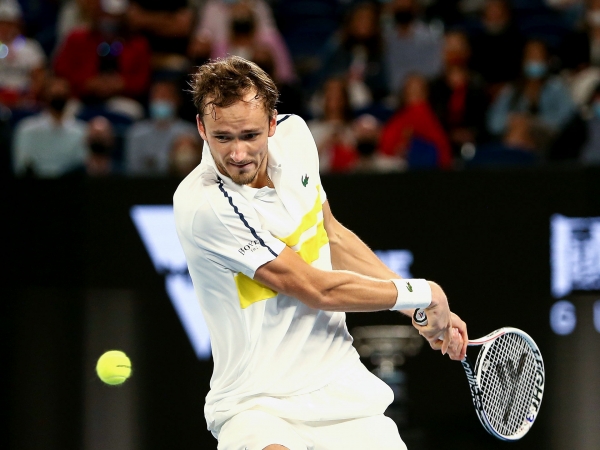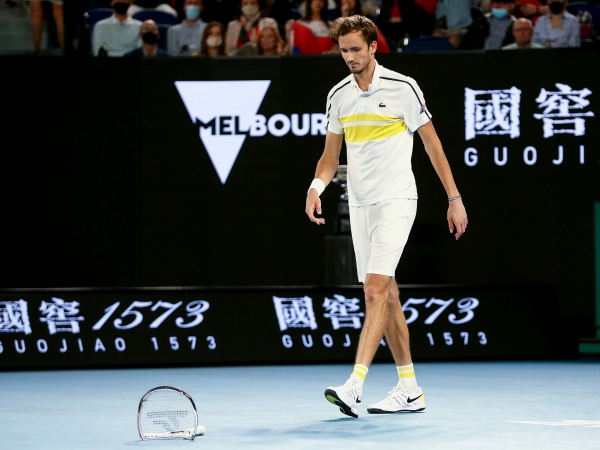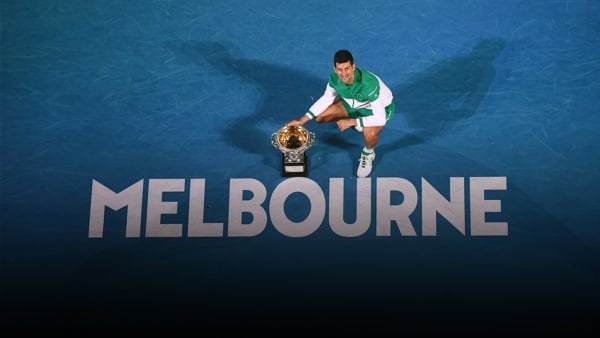Daniil Medvedev vows streaks are made to be broken.
Unfortunately for the Muscovite – on a 20-match unbeaten stretch – he ran head-on into a man on a 20-match Australian Open streak at Melbourne Park on Sunday night.
Something had to give.
While it was Djokovic who came out a 7-5 6-2 6-2 victor, Medvedev departed with much to be proud of from his route to a second major final.
MORE: Super Novak flies to ninth AO title
He had notched 12 wins against top-10 opponents – including one against his vanquisher.
Only the Big Three had longer winning streaks against the sport’s best.
“I think I got closer because I always say experience is the key for me,” Medvedev said.
“Next time if I play Novak ever here in the final, I for sure going to do some things on the court, maybe off the court also, differently because at least I would have this experience where he [beat] me easy.
MORE: Analysis: How Djokovic won the final
“So I'll try to do something better. Doesn't mean that I will succeed, but that's life of a tennis player.
“Talking about the top three, I always say they're just better than other tennis players. I'm not shy to say this. It’s just truth … in numbers and everything. After, of course, when you're out there, you want to beat them.
“You don't care that it's the big three or the big 100. But that's why they have so many Slams. They're just really good.”

Having booked his berth in Sunday’s final and waiting to see who his opponent would be, Djokovic had deemed the 24-year-old “the man to beat”.
After inflicting defeat and in light of three prior losses from the pair’s now eight showdowns, Djokovic dubbed him “one of the toughest opponents I have faced in my life”.
MORE: Djokovic sticks to familiar Melbourne script
The enormous respect was mutual.
Medvedev was only 11 when Djokovic won the first of his nine Australian Open crowns in 2008.
Seven years later, as a promising junior he met the Serb in Monte Carlo for the first time before flying to Minsk to compete in a Futures event.
“I first practised with Novak when I was 500 or 600 in the world in Monaco,” he said. “He was already No.1 and had just won Wimbledon and I thought ‘OK, he's not going to speak to me’ or something because the guy was a god for me.
“I was shy and I didn't speak, so he was asking me questions and was talking to me like a friend. I was really surprised. You've never changed since I was 600 in the world, or No.4 in the world, you're a great support.”
Medvedev joined Andy Murray (four times), Rafael Nadal (twice), Jo-Wilfried Tsonga and Dominic Thiem on a long list of challengers who have tried and failed to beat the 18-time Grand Slam champion in a final on Rod Laver Arena.
Trailing two sets and 4-2 in the third, there was a moment of Medvedev brilliance when he ended a gruelling exchange with a searing forehand winner into the corner, lifting his arms to bring the crowd to a crescendo.
Sensing it may be his last chance to conjure a comeback, he upped the ante and the grunts, but still the world No.1 remained a brick wall.
MORE: Djokovic v Medvedev match stats
Djokovic pointed to his head as he withstood the barrage and strode to the chair only a game from glory.
The Russian knew what it took to defeat the world’s best player, but doing so in a best-of-five clash ultimately proved a hurdle too high as Djokovic flicked an overhead winner to seal the outcome.
Medvedev’s 20-match streak may have been broken, but defeat brought about a new mission – to overturn a 0-2 record in his next major final.

“I always say that after I finish my career, no matter 20 Slams, one Slam, zero Slams, if I always try – of course, you cannot be 365 days in a year at your best, but if I try to do my best, that's why I became more professional a few years ago, working more physically, mentally on the court, out of the court, trying to eat good during tournaments,” he said.
“That's where I will have no regrets when I finish my career no matter what I achieve. That's, I find, the most important after such defeats.”
